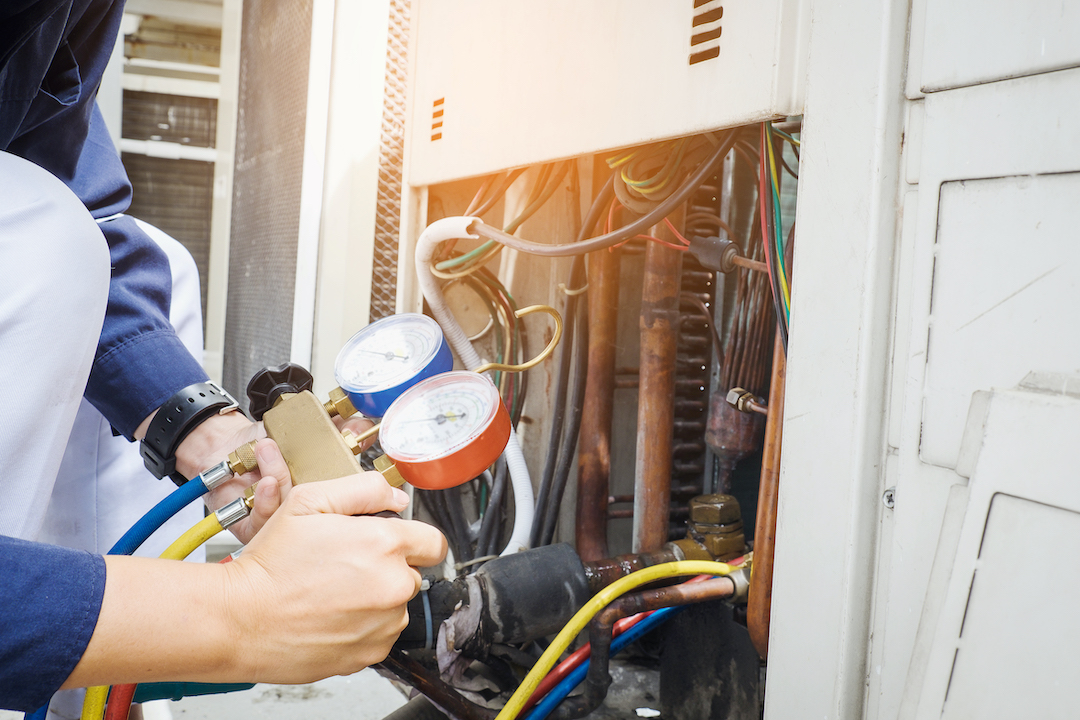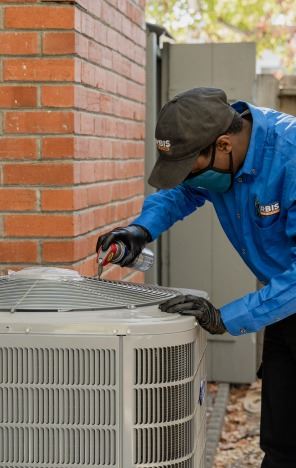How to Know It's Time for a furnace replacement
How to Know It's Time for a furnace replacement
Blog Article
Picking In Between a Warm Pump and Heating System: Key Factors To Consider for Your Heating And Cooling Demands
When reviewing heating choices for cooling and heating requires, the decision in between a warm pump and a furnace can be complicated. Each system offers unique benefits customized to specific climates and power performance objectives. Understanding these differences is necessary for making an enlightened option. Key factors such as setup prices and environmental impact additionally make complex the selection process. Which alternative truly aligns with one's comfort and sustainability choices? The complying with areas will certainly discover these considerations carefully.
Understanding Warmth Pumps: Exactly How They Work and Their Advantages
While numerous house owners take into consideration various home heating alternatives, understanding exactly how heatpump function and their benefits can substantially influence their choice. Heatpump operate by moving warm as opposed to creating it. In the winter months, they draw out heat from the outdoors air or ground and transfer it inside your home, while in the summer, they reverse this procedure, cooling the home by removing warm outside. This twin functionality makes them functional for year-round climate control.One of the key advantages of heat pumps is their power performance. They use significantly less electrical power compared to typical heater, possibly resulting in lower utility expenses (heat pump service). Furthermore, warmth pumps have a smaller sized carbon impact, making them an environmentally friendly option. They also need less upkeep than standard systems, adding to long-term expense savings. Overall, comprehending the technicians and benefits of warmth pumps can assist home owners make notified choices regarding their heating and cooling down demands
Discovering Heaters: Types, Operation, and Advantages
Heaters can be found in numerous kinds, consisting of gas, electric, and oil designs, each with distinctive functional mechanisms. Recognizing these distinctions is important, as they influence performance and home heating efficiency. Furthermore, heaters supply many benefits, such as constant heat result and dependability in colder environments.
Sorts of Furnaces
Heating systems can differ substantially in style and operation, with heating systems being a prominent selection amongst home owners. There are numerous kinds of heating systems, each using various fuel sources and modern technologies. Gas heating systems are common, leveraging all-natural gas to produce warmth effectively. Electric furnaces, on the other hand, make use of electrical resistance to create warmth, often preferred for their straightforward setup. Oil heating systems, while much less usual, are reliable in locations with minimal gas access (furnace replacement). In addition, condensing heaters make the most of power performance by reusing and recording exhaust gases. Each kind operates through a system of warm exchangers and ductwork to distribute warm air throughout a home. Recognizing the distinctions between these furnace types is necessary for educated heating and cooling choices
Benefits of Heating systems
For property owners seeking reputable warmth during cold months, the benefits of heating systems are considerable. Heating systems provide regular heating, making certain also temperatures throughout the home. They are especially effective in extreme cool, usually outmatching heat pumps in frigid conditions. Various kinds, consisting of gas, electric, and oil heaters, supply flexibility to meet diverse demands and preferences.Furnaces additionally often tend to have lower first installation costs compared to heatpump, making them an extra obtainable alternative for several. Their robust layout adds to a much longer life-span, with many systems lasting over 15 years with correct maintenance. In addition, modern-day heating systems are usually geared up with sophisticated modern technology for enhanced performance, which can cause minimized energy bills. In general, heating systems remain a trustworthy choice for reliable home heating.

Energy Performance: Contrasting Heat Pumps and Furnaces
When contrasting power effectiveness between warm pumps and furnaces, the Seasonal Energy Efficiency Proportion (SEER) plays a necessary duty in determining efficiency. Furthermore, a functional expense analysis discloses the long-term monetary effects of each system. Understanding these elements can direct homeowners in making notified choices about their home heating solutions.
Seasonal Energy Effectiveness Proportion
Energy performance plays a necessary function in the decision-making procedure in between heat pumps and heaters, particularly when taking into consideration the Seasonal Power Performance Ratio (SEER) This statistics actions the cooling efficiency of heatpump over an entire cooling period, offering a standard method to assess efficiency. Higher SEER rankings indicate better power effectiveness, converting to lower energy usage and lowered utility costs. On the other hand, heaters are normally assessed using the Annual Gas Utilization Efficiency (AFUE) ranking, which reflects home heating efficiency. When contrasting these 2 systems, home owners need to prioritize SEER scores for heatpump, as they directly impact general energy savings and ecological sustainability. A detailed understanding of SEER can significantly affect the long-lasting satisfaction and cost-effectiveness of the selected cooling and heating remedy.
Operational Expense Evaluation
Comprehending the functional costs related to heatpump and furnaces is important for homeowners examining their alternatives. Heatpump normally offer higher power performance, converting electrical energy right into warm with marginal waste. This causes lower monthly energy costs, specifically in moderate environments. On the other hand, typical heaters, especially gas designs, might have lower upfront costs but can sustain greater operational costs gradually because of fuel rates and performance ratings.Moreover, heat pumps can work as both heating and cooling systems, potentially decreasing the requirement for different a/c systems. While first investments for heatpump may be higher, their long-term savings in energy effectiveness can make them a much more cost-effective choice for numerous homes. Careful analysis of neighborhood power prices is important to identify the very best option.
Installation Prices: What to Anticipate for each and every Heating Unit
Installation prices for home heating systems can differ significantly between heat pumps and furnaces, affecting property owners' choices. Heatpump usually have higher ahead of time setup expenses, usually varying from $3,500 to $8,000, depending upon the device dimension and intricacy of installation. This consists of the outdoor device, indoor handling system, and required ductwork alterations. Conversely, furnaces have a tendency to have lower preliminary costs, balancing between $2,500 and $6,000, which can be appealing for budget-conscious home owners. Nonetheless, installment expenditures can increase if comprehensive ductwork is required.Moreover, the choice of fuel kind for heaters-- natural gas, propane, or electric-- can additionally impact setup costs. While heatpump offer energy effectiveness, their preliminary financial investment may discourage some buyers. Inevitably, examining installation expenses together with long-lasting financial savings and performance will help property owners in making informed decisions concerning their heater.
Climate Factors To Consider: Which System Does Better in Your Area
Just how do climate problems influence the efficiency of heating systems? The performance of warmth pumps and heaters can differ substantially depending upon the neighborhood climate. In modest climates, warmth pumps excel by efficiently moving heat from the outdoors air, making them an energy-saving alternative. Their efficiency lessens in exceptionally cool temperature levels, you could check here where they might battle to draw out sufficient warm. Alternatively, furnaces, specifically gas models, supply consistent and dependable warm despite exterior problems, making them preferable in chillier regions.In areas that experience milder winters, warmth pumps can operate efficiently year-round, providing both cooling and heating. On the other hand, regions with rough winters commonly take advantage of the robustness of heating systems. Eventually, understanding the regional environment is vital when making a decision between a warm pump and a heating system, as it straight impacts their functional performance and total performance.
Upkeep Requirements: Long-Term Look After Warmth Pumps vs. Furnaces
While both warm pumps and heating systems require regular maintenance to guarantee peak efficiency, their certain needs and treatment regimens differ substantially. Heaters commonly require much less regular attention, with yearly assessments sufficing to look for gas leakages, clean filters, and analyze total capability. Their simpler style navigate to these guys often permits simple repairs.In contrast, heat pumps demand biannual upkeep because of their twin duty in cooling and heating. This includes cleansing coils, examining refrigerant degrees, and ensuring that both the exterior and interior units work at their best. In addition, heatpump upkeep frequently includes even more detailed elements, making specialist servicing essential.Neglecting upkeep can bring about reduced efficiency and boosted power costs for both systems. Inevitably, property owners need to think about these long-term treatment needs when choosing in between a heat pump and a heating system, as positive upkeep can extend the life-span and efficiency of either system considerably.
Ecological Influence: Choosing a Sustainable Heating Choice
The ecological influence of furnace is a vital evaluation for property owners seeking sustainable options. Heatpump are normally more energy-efficient than conventional heaters, as they move heat as opposed to create it, significantly minimizing carbon exhausts. By making use of renewable power sources, such as air-source or geothermal heatpump, house owners can further reduce their environmental footprint.On the other hand, natural gas heating systems send out greenhouse gases and add to air contamination, though they typically supply higher warm outcome. Nevertheless, developments in innovation have led to the growth of high-efficiency furnaces that lessen emissions.Ultimately, choosing a home heating system entails evaluating effectiveness against environmental influence. Home owners are urged to assess local energy resources and rewards for sustainable systems, guaranteeing an option that straightens with both personal convenience and environmental duty. The choice impacts not only instant convenience but also long-lasting sustainability and ecological health.
Often Asked Questions
For How Long Do Warm Pumps and Furnaces Commonly Last?
The life expectancy of heatpump typically varies from 15 to 20 years, while furnaces can last between 15 to three decades. Normal upkeep substantially impacts their durability and effectiveness in offering home heating solutions.
Can I Utilize a Heatpump in Exceptionally Cold Climates?
Heatpump can operate in very cool environments, yet their effectiveness lessens as temperature levels decrease. In such conditions, extra home heating resources might be needed to keep comfy interior temperatures and ensure peak efficiency.

What Is the Noise Degree of Heat Pumps Versus Furnaces?
The noise levels of heatpump and heaters vary substantially. Typically, heat pumps operate even more quietly than conventional furnaces, making them better for those conscious appear, while furnaces may generate louder functional sounds throughout heating cycles.
Are Warm Pumps Suitable for Both Cooling And Heating?
Warm pumps are undoubtedly ideal for both cooling and heating (heat pump replacement ooltewah check my blog tn). They function by transferring heat, supplying reliable temperature control year-round, making them a flexible choice for property owners looking for an all-in-one a/c solution
What Dimension Furnace Do I Required for My Home?
Figuring out the suitable size heating unit for a home needs assessing variables such as square video, insulation high quality, local environment, and the home's design. Consulting a professional can assure an accurate evaluation and ideal convenience. Heat pumps generally offer higher power performance, transforming electrical power into warm with marginal waste. In moderate environments, warmth pumps stand out by effectively moving heat from the outside air, making them an energy-saving option. On the other hand, furnaces, particularly gas versions, offer reputable and consistent heat regardless of outdoor conditions, making them better in cooler regions.In areas that experience milder winter seasons, warmth pumps can operate properly year-round, giving both home heating and cooling. Warmth pumps are normally much more energy-efficient than conventional heating systems, as they move heat instead than produce it, substantially minimizing carbon emissions. By utilizing sustainable power sources, such as air-source or geothermal warmth pumps, property owners can additionally lessen their eco-friendly footprint.On the various other hand, natural gas heating systems give off greenhouse gases and add to air contamination, though they usually provide greater warmth outcome.
Report this page